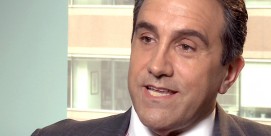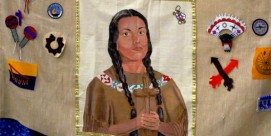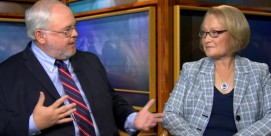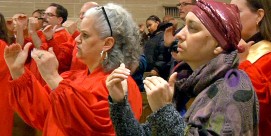In This Episode << SLIDE LEFT TO SEE ADDITIONAL SEGMENTS
Paul Pearson on Thomas Merton
Read more of Judy Valente’s interview about Thomas Merton with Paul Pearson, director and archivist at Bellarmine University’s Thomas Merton Center in Louisville, Kentucky.
Q: What would you say is the essence of Thomas Merton’s spirituality?
A: The essence of Merton’s spirituality is, I think, the humanity of it, that he really speaks to ordinary people. You know, I don’t think there’s anything particularly new in it. He knows so well the great classics of Christian spirituality, but he can interpret them in a way that people in our world today can understand and can relate to, and I think that was his great contribution, and in the period when he started writing, in the late ’40s and the ’50s, certainly within the Catholic Church prior to the Second Vatican Council, that kind of spirituality was unheard of for your ordinary lay person. Spirituality really belonged to the monks and nuns and bishops and what have you, whereas, you know, your ordinary lay person went to Mass on Sundays, the Mass was in Latin, they said the rosary, and that was the extent of it, and Merton, I think, really opened up that whole realm of contemplation and spirituality for people, and so much that we’re familiar with now came about through that.
Q: Was that his main message to lay people, to the ordinary person, that you too can enter into this type of deep union with God?
A: I think it was in the early days. In the early days, you know, Merton gives the impression that all he’s interested in is a spiritual life, that he’d entered Gethsemani in 1941, and he was turning his back on the evil world outside the monastery. But I think gradually, through his experience in the monastery, through the response to the publication of The Seven Storey Mountain and all the correspondence that he received from people, in dealing with the young men who he was teaching at monastery, Merton realized that he couldn’t leave the world behind at the monastery gate, that he was actually in the monastery for the world. And so his spirituality began to change so that it involved tackling the issues that were of concern to everybody in the world. So in some ways it’s his combination of contemplation and action, I think, that really marks out his spirituality. You know, I think in that period probably there was lots of writing about spirituality. But none of it combined it with action in the same way that Merton did.
Q: What were some of those issues he was concerned about getting people thinking about out in the world and relating to their religious life, their spiritual lives?
A: I think initially some of the issues Merton was most concerned about, you know, were the major issues facing society at that time, and especially going into the ’60s issues surrounding the Cold War, so to do with the nuclear arms race, issues to do with war and peace and nonviolence.
And then, as the ’60s wore on, things like, obviously, the Vietnam War came up and, you know, you can just see similarities with the world today. You know, we seem to have got over the Cold War of the ’60s and now, you know, you’ve got, you know, relations with China or Russia seem to be changing all the time. But then he also began writing about issues to do with civil rights, and certainly prejudice hasn’t gone away in our own day, and gradually beginning to touch on other issues such as feminism, the use and abuse of technology, the effects of the media, ecology. Merton was one of the first people to review Rachel Carson’s book Silent Spring, and he also had it read in the monastic refectory and was very much involved with reforestation at the monastery, you know, concerned about the impact that the monks had had on the local environment.
Q: Why do you think people still find him so compelling today and are still reading his books today?
A: I think people are still reading Merton’s books today because he speaks so clearly about all the issues that we’re still dealing with. You know, I think if he were to come back he would be very frustrated with us that we don’t seem to have learned anything; that, if anything, many of those issues that he was writing about have been magnified or they’ve become more kind of ingrained in society, if anything. You know, a lot of the segregation in the ’60s was very marked, whereas now, you know, I think there are more subtle forms of segregation which maybe are even worse than what it was like then. I know people refer to things like ecological racism and things like that and, you know, we can still learn a lot from his writings.
Q: He was extremely prolific. How was he able to accomplish so much in a period of basically 20 years?
A: Merton was, you know, just an extraordinary figure in the way that he wrote. You know, Seven Storey Mountain was published in 1948, and he died in 1968, and the number of books he wrote during that period, you know, along with articles or journals and all the other work that he was doing, teaching first to scholastics and then to novices, the spiritual life of the community, spiritual direction, and yet he wrote this incredible number of books. And I think people often think that he just wrote and published, that, you know, as it flowed off his pen it was ready for publication. But it wasn’t, and we’ve certainly got manuscripts here where you can see him reworking and reworking his material. So, for example, with The Sign of Jonas we actually have five variant typescripts, and that’s not an issue like today of just inserting a few paragraphs on the computer. It’s retyping a whole typescript of 400-plus pages.
Q: But how do you think he was able to do that? What enabled him to be so prolific and productive?
A: I think it was an incredible sense of focus, that he could really focus on what he was doing. I think one of the monks told me the story that, you know, with Merton if, you know, a book arrived in the mail in the morning he would’ve read the book, he would’ve drafted a review, revised the review, and had it ready to mail back to a major magazine by lunchtime and that it would be, you know, fit to be published in the New Yorker, or somewhere. Whereas, I know if I write a book review it takes me weeks. So he just works on a different intellectual level and, you know, monks will say that he never wasted a moment of time, that if he was sitting outside the abbot’s office for a meeting, he would be working, and when he was giving spiritual direction he was, you know, always there with the person, but when he felt that the time had come to an end, that they were wasting time, he soon cut it off.
Q: What made him controversial?
A: Merton became controversial because of his movement away from just writing about spirituality and beginning to write about the issues of his day. You know, I think people love that monk who would write, you know, these wonderful books about spirituality that flowed from his pen or off his typewriter in the ’50s. But as he changed from the world-denying monk to the world-embracing monk of the ’60s, you know, people began to think, “Well, why should he be writing on these issues? He’s away in a monastery. What does he know about them?” And especially when he began criticizing some of the viewpoints that the people were taking, or that the government was taking or the Church at that time, and certainly within the Catholic Church. The first Catholic was in the White House, and so I think there was a sense with a lot of Catholics of loyalty to the country, and yet here was Merton criticizing some of the stances that were being taken by the government. I think nowadays Catholics would much more readily agree that would be the position, you know, they should be taking. But that wasn’t the case in the ’60s.
Q: How about his inquiries into Eastern monasticism, Eastern religions? How controversial and unusual was that?
A: It was certainly unusual in that period, and I don’t think I would say it was controversial in the ’60s. I think in some ways people were much more open to it at that time than maybe they are nowadays. But certainly when, you know, in the late ’50s Merton first started working with students from other Christian denominations, you know, seminarians from the Presbyterian seminary here in Louisville or the Southern Baptist seminary would go down to dialogue with Merton and other members of the community, and that was really unheard of within Catholic circles prior to the Second Vatican Council. And then, gradually, you know, he began to expand that through his correspondence with peoples of other faiths, and often, then, those people would come and visit him at Gethsemani, and he would get them to talk to the novices or to the community. And so there was a real interfaith dialogue that was being generated from Gethsemani, and dialogue not about issues of doctrine, which they’d often not agree about, but more of an experiential approach to God, which was more monastic, in a sense: how do we pray, how do we understand God, and things like that.
Q: What makes him controversial today, to the extent that the Catholic bishops would not even include his biography in an official catechism?
A: I think people get the impression, and you know, I think it’s a very shallow reading of Merton, was that he was, you know, ready when he went to Asia to become a Buddhist or something, and, you know, they’re not seeing what was written in his books when they take it in that way. You know, I think Merton was able to dialogue with people of other faiths because he was so firmly rooted in his own tradition. It wasn’t any wishy-washy New Age kind of thing. Merton could dialogue from within the tradition, and, you know, if you look at his last entries in his personal journal in Asia, he talks about celebrating Mass. He’s got his Latin breviaries with him. He still preferred the Latin to the English translations. He was having lunch with the apostolic delegate, and the conference that he died at was a conference of First-World monasteries assisting Third-World monasteries, you know, Benedictine and Cistercian monks and nuns. Merton wasn’t about to become a Buddhist monk, and, you know, I think there’s a certain element in the Catholic Church that, you know, is almost going back to the pre-Vatican II days that there’s no salvation outside the Church, that kind of attitude. And, you know, I think it was pressure from that group that led to Merton being taken out of the catechism. And yet I hear young people saying, you know, it’s just a sign of how out of touch the bishops are that they would remove somebody like Merton and yet leave in all these other people who, you know, are not relevant to our modern world.
Q: What are some of the main things you think Thomas Merton would have to say to today’s seekers, to today’s world?
A: What would Merton have to say to today’s world? In many ways, I’m not sure it would be that different from what he was writing in the ’60s. I think that’s why his books are still selling, why they’re still being translated, because that message is as relevant today as when he wrote it. You know, just encouraging people to persevere in their spiritual journey, to see how their spirituality integrates with their daily life, with their social life, with their involvement with the world and with politics. I think if people really took that message seriously, you know, the world could change drastically. But people don’t. It’s a difficult message.
Q: Could you briefly describe how he died, how that transpired?
A: Merton died in Asia at a conference in Bangkok. He’d been invited there by a Benedictine monk to give the keynote address, and he did the address, his address, on the morning of December the 10th, 1968, and then sometime in the afternoon, after lunch apparently, he’d had a siesta and took a shower and then after his shower went to adjust one of these large, freestanding electric fans that was in his room, and he was electrocuted by touching faulty wiring on the fan. And, of course, the voltage in Thailand is much higher than here. I think it’s 220 or 240 volts.
Q: Would it be fair to say Thomas Merton was ahead of his time, and in what way?
A: I think so, in a number of ways, and yet in some ways he’s so deeply in the tradition. But, you know, that’s a part in the tradition that often gets overlooked. I think in the church fathers he would find this very different vision of the world, and so although I would say, yes, he was definitely ahead of his time, being ahead of his time was based on the tradition, and he discovered that through his reading, you know, of the monastic fathers, the church fathers, about how they worked with the society of their day. You get this impression of the monks in the early centuries going off into the desert and turning their back on the world. But then you hear these stories of, you know, the emperor or the leading people of their day going to the monks to consult with them about the issues they were concerned about and, you know, these monks off in the desert giving the leaders advice. And in a sense that’s just what Merton was doing in the ’60s, you know, he was communicating with people all over the world: popes, presidents, Nobel Prize winners and, you know, they saw that he had a wisdom that our world needed then and still needs today.
Q: What did the world lose by his dying in his prime?
A: I think with the death of Thomas Merton we lost, really, one of the great Catholic voices, one of the great prophetic figures within the Catholic Church. You know, it’s hard to imagine what he would be doing if he were still alive today and, you know, he could be. He’d be in his 90s, but he could still be alive. In many ways he would be saying the same things he was saying in the ’60s, which is a very sad reflection on us that we don’t seem to have moved forward, or moved forward in the right direction. And yet, you know, he was writing about technology and computers, and all of those things have developed so much more since he was writing about them. I think we miss out on how he himself would have carried his thought forward, how he would have tackled the issues in the way that we’re facing them nowadays.








